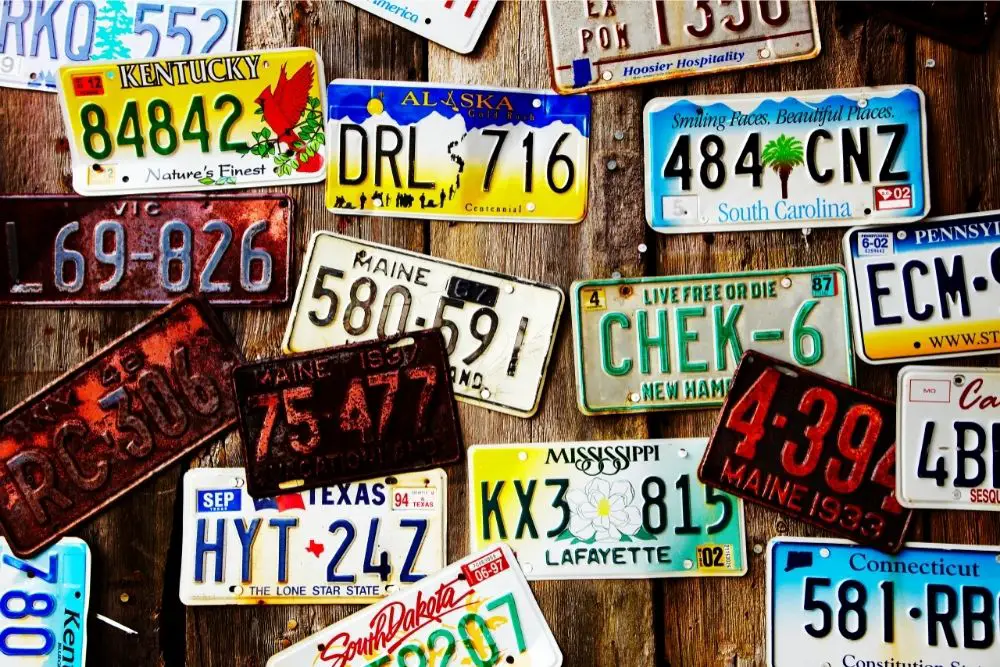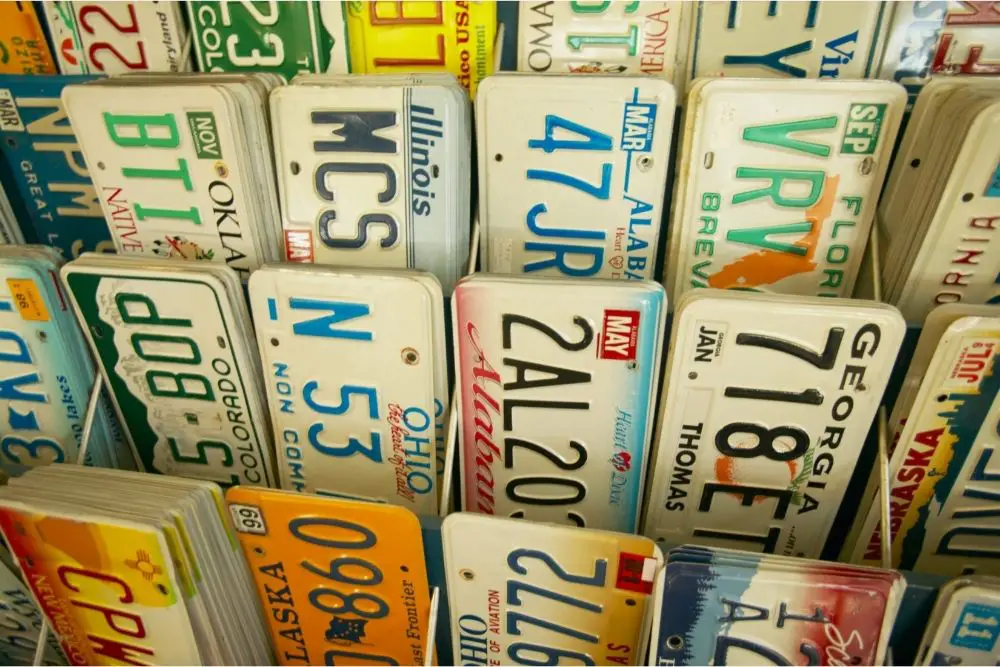Last Updated on May 11, 2022 by Fair Punishment Team
There are multiple legitimate reasons why a civilian might try and run a license plate, but the long and short of it is that you can’t. It’s illegal to run a license plate, and any website claiming to do it for you is likely to be a scam.
A license plate can provide you with information about the owner of a vehicle, which you may be interested in if you’ve witnessed, or been involved in, a crime or accident. However, on almost any occasion when you might consider running a license plate, the better option is to contact law enforcement.
In this guide, we’ll cover exactly what happens when you run a license plate, and the kind of information you might obtain. We also answer any questions you might have about the legal ramifications of running a license plate.
If you’re interested in obtaining information from a license plate, you should always consider contacting law enforcement instead.

Can a civilian run a license plate?
There are a huge number of cars in each state, and information on them is stored in various databases. These databases are available to law enforcement, and contain information about the car and its registered owner.
These records are not available for civilian use. A civilian cannot run a license plate, and won’t be able to access this information. If you jot down the number of a license plate in the street, you won’t be able to look it up.
The DMV has the capability to run license plates, and they can provide some help. But it won’t be a simple exchange of information. Instead, you’ll be asked to fill out a form and pay a fee to ensure you have a legitimate reason for needing the license to be run. And if you can’t provide a good reason, then your request will be denied, and the DMV may choose to alert the police.
When you look online, you might come across websites claiming to run license plates for a fee. This is against the law, and you are likely to face consequences for using these websites. And that’s after the website has taken your money and, quite possibly, provided you with false information.
Whether you’ve been involved in an accident or witnessed a crime, the better course of action is to contact the police.
Is it illegal for a civilian to run a license plate?
We’ve established that civilians can’t run a license plate, but it’s vital to understand that the act is illegal.
Even if you believe you have a perfectly legitimate reason for needing to run a license plate, there are numerous illegitimate and illegal reasons why someone might want that information.
Because of this, even attempting to run a license plate can result in police involvement. Whether you enter your information into a website claiming to run plates, or speak to someone with a friend of a friend who says they can sort you out, you will be breaking the law.
In most cases, the better course of action is to contact the police. It might be that you were involved in a hit-and-run, and you want to take things into your own hands. This is a bad idea, for many reasons. Provide your insurance company and the police department with the information, and let them deal with it.
If you want to run a license plate for personal reasons, then you have to consider whether this is the best course of action. In most cases, there’s very little reason why you’d need access to the information a license plate can provide.
Depending on your state laws, you may be able to look up basic information about the license plate at the DMV. However, this is a lengthy process, and there’s a good chance your request will be denied.

What information can the police access by running a license plate?
It’s a scene that we all recognize from cop movies and shows. Someone commits a crime and gets away with it. The police are stumped, until they come across a blurry photo of a license plate. They head to the DMV, run the plates, and now have access to a wealth of information about their perpetrator. After a tense chase, the perp is arrested, and the crime is solved.
Although this may not be an entirely accurate representation of the legal system, the truth is that police do have access to records based on license plates. And they can often gain access quickly. If you ever get pulled over driving a car that isn’t yours, the police are likely to already know the real owner of the car.
So, what can the police see when they run a plate?
- The full name of the registered vehicle owner.
- The full address of the registered vehicle owner.
- If the car is registered in a state, and what state it’s registered in.
- If the car has been reported as stolen.
- If the car matches the vehicle the plate is registered to.
- And in some states, the police can see if the vehicle has valid insurance.
This information can help the police to immediately see if the car has been involved in a crime, and if the driver is the registered owner of the car. This also isn’t information that the average civilian has any use for.
The information provided by the license relates to the car, and who should be driving. It isn’t necessarily always accurate to who is driving the car. With this in mind, you can understand why a civilian hoping to run a plate could get some seriously wrong information.
Can people access information about me by running my license plate?
Running a plate provides information about the name and address of the owner of a car. Although you can probably think of several times when this is valuable information to have, you can probably think of even more times when you’d want to keep this information from someone.
Imagine if any person who saw you get into your car could easily access information about where you live. That’s probably not a scenario you would enjoy.
So, it’s reassuring that as you can’t run license plates, neither can other civilians. Depending on the state, they may be able to find some basic information about the vehicle if they have a valid request.
Of course, the police can find out information about you by running your license plate. If you let other people drive your car, and they get pulled over, the police will know they aren’t the registered owner of the vehicle. And if your car has been stolen, and it’s later found, you can be contacted as the registered owner.
If you’ve been frustrated that your legitimate search for information has been stymied, be reassured that the restrictions go both ways.

Can the DMV run a license plate?
Yes, the Department of Motor Vehicles, or DMV, can run a license plate. But they won’t just do it for anyone who asks. And anyone working at the DMV can’t run a plate simply for their own amusement. If you want to run a plate at the DMV, then there’s a strict set of rules you need to follow.
The DMV are able to run plates for both civilians and law enforcement. But if you are a civilian, the DMV will require you to complete a request form.
If you do want to try and get a license plate run by the DMV, contact your local department first. They’ll be able to give you the exact state rules regarding license plate lookups, and how to go about it.
It’s likely that your next step will be to complete a request form. You may be able to do this online, or you may need to pick up a paper copy from the DMV. The details of the request form vary from state to state. The request form may be relatively easy to complete, or off-putting and complicated. It will depend on your state laws, and your exact reason for wanting to run plates.
You will probably have to pay a fee to run a license plate, and the exact cost varies by state. It’s unlikely to be costly, but the price might still deter you from running the plate. With this paid, you’ll have access to the information the DMV can provide.
Remember, the DMV can deny your request if they don’t believe you have a good reason for making it. If your request doesn’t comply with the Driver’s Privacy Protection Act, the DPPA, then you will be denied.
Although the DMV does run plates, it’s important to understand that they won’t just do it for anyone. They also can’t look up plates for no reason, or access private information for their own personal usage.
I’ve found a website claiming to run license plates – is it legit?
If you’ve found a website claiming to run license plates, then it’s probably not legitimate. And even if it is, you still shouldn’t give them your information. Running a license plate this way is illegal, and can result in some severe consequences.
If you’ve found a website running license plates for “free”, this is likely to be a scam. If you intend to legitimately run a plate via the DMV, you will be required to pay a fee. A “free” service is likely to be giving you false information.
Some websites require a fee to run a plate. In that case, there are two possible options. Either, you’re paying for information that has been illegally obtained. Or, you’re paying for false information. Neither of those options should be particularly appealing.
It’s important to remember that there’s no guarantee any of these websites are providing you with accurate information.
Will the police tell me what they’ve found by running a license plate?
Perhaps you’ve witnessed a hit-and-run, or you’ve been involved in one yourself. Either way, you managed to take a picture, or make a note, of the license plate. You then take this to the police, so they can run the license plate, and find the culprit. Or, at least, the owner of the car.
In this case, you may be curious to find out the details. However, how much the police will tell you will depend on how much you need to know. The chances are, you don’t need to know very much.
The police department definitely won’t just run a plate to provide you with information. They’ll run the plate for their own needs, and potentially let an insurance company know the details.

What about a private investigator?
Hundreds of thousands of hit-and-runs are reported every year in the United States. Unfortunately, only a tiny number of these ever get solved. A lack of evidence tends to mean the police department is left with limited lines of inquiry.
If you’ve been involved in an accident like this, then you may be left unsatisfied by the police response. In which case, you might consider hiring a private investigator, or P.I.
A licensed private investigator can run plates via the DMV, and gain access to information about a vehicle. They may be able to access the vehicle owner’s name, address, and a description of the car.
Licensed private investigators will probably find it easier than the ordinary civilian to run plates. Primarily because they will be familiar with the process, and the DMV will be familiar with these requests.
However, a P.I. is still subject to the Driver’s Privacy Protection Act. And because of the DPPA, a P.I. will only be able to access information as and when they need it. If a private investigator can’t provide a legitimate reason for the information, then they won’t be granted access.
Of course, what a P.I. can do with this information is probably more than the average civilian.
A P.I. is also likely to provide you with the information obtained by running plates, unlike the police. But because of the expense involved in hiring a licensed P.I., this is rarely an obtainable course of action.
Why might you want to run a license plate?
While there are some legitimate reasons to need to run a plate, the reality is these instances are rare. However, you may be interested in running a license plate if:
- You were involved in a hit-and-run.
When you’ve been involved in a hit-and-run, you may want to take matters into your own hands. Whether you feel the police response wasn’t enough, you want to take evidence to your insurance company, or you just want to make someone feel bad. Either way, you might want to run a license plate, and find out who wronged you.
This isn’t a good idea. If you want to involve the police or insurance company, you need to speak to them directly, rather than running the plates yourself. Revenge is also not a good idea, for various reasons.
- You’re an employer and you need to verify information.
Employers can contact the DMV to run a plate if they need to verify an employee’s personal information, or verify an employee has a commercial driver’s license. Like any civilian, the employee will need to verify they have a legitimate reason for this request.
- You’re producing a statistical report.
The information obtained from a license plate can be used to create statistical reports and research, but personal information cannot be published. If this is your intention, then you will need to speak to the DMV directly.
- You’re trying to buy a second hand car.
There can be a worry, when buying a second-hand car, that the car has been stolen. If the car has been reported stolen, then it will show up when the license plate is run. Again, this would need to be done via the DMV, but be aware that your request is likely to be denied. Instead, contact the police on the non-emergency number, and provide them with the license plate.
Conclusion
In some rare circumstances, a civilian can run a license plate. But these occasions are rare, and you must do so via the DMV.
In most cases, a civilian has no legal right to run a license plate. Instead, doing so is illegal, and violates the Driver’s Privacy Protection Act.
Rather than trying to run the plates yourself, it’s better to contact the police. You may not be provided with the information, but the police will be able to react appropriately.
